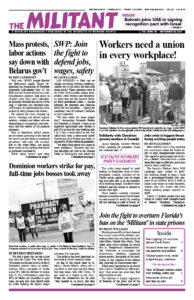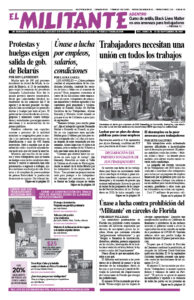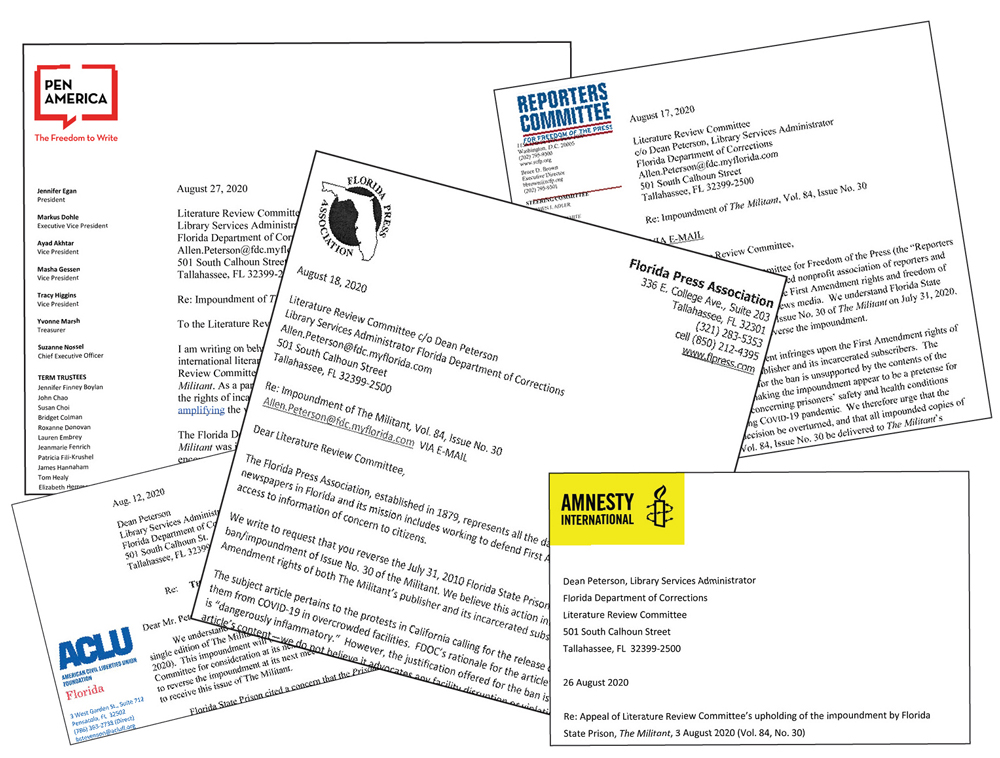Florida prison officials have banned four recent issues of the Militant, preventing them from reaching dozens of subscribers behind bars there. They claim each issue contains an article that is “dangerously inflammatory” and “advocates or encourages riot insurrection, rebellion, organized prison protest, disruption of the institution, or the violation of the federal law, state law, or Department rules.”
While each ban points to an article they claim is “dangerously inflammatory,” they never say what they find objectionable or why.
The Militant is urging supporters of freedom of the press and of the rights of workers behind bars to join in pressing Florida Department of Corrections Literature Review Committee to lift the bans.
Issue no. 30 was impounded for the article “Prisoners Demand Release from Overcrowded Jails.” It describes a peaceful rally in California by inmates’ family members and supporters urging the state government take steps to relieve the dangerous overcrowding in prisons there amid the COVID-19 pandemic. It also reports on a letter from a prisoner describing conditions where he is held and a possible hunger strike by about 20 prisoners over this situation.
After the Literature Review Committee upheld the ban, Militant attorney David Goldstein appealed this decision. On Sept. 14 Goldstein also filed an appeal against the impoundments of issues no. 31 and 33.
Issue no. 31 was impounded for the article “Workers Oppose Federal Cops, Antifa Violence in Portland.” “The article unmistakably and repeatedly opposes violence by all sides concerning the protests in Portland, whether by antifa or by federal or local police,” Goldstein wrote.
“To read this article and conclude that it ‘is dangerously inflammatory,’” noted Goldstein, “is simply incomprehensible,” and certainly unconstitutional.
This topic has been extensively covered in the media, in Florida and nationwide. The only conclusion to be drawn, Goldstein said, is that state prison officials “are targeting the Militant because of its political viewpoints.”
The Militant is currently mailed to 152 subscribers in 87 federal and state prisons in 23 states, including 61 subscribers in 24 state prisons in Florida. No other subscriber in a state or federal facility outside of Florida has had these issues impounded, the appeal notes.
Issue no. 33 was banned because it reported on a ban of a prior issue of the Militant. The headline read, “After Pennsylvania Prison Ban Is Revoked, Florida Prison Bars ‘Militant.’” The Militant has been informed that issue no. 34 was impounded for running an article describing growing support for overturning the ban.
Florida prison officials have attempted numerous times to ban issues of the Militant that reported on previous bans, which the Literature Review Committee subsequently overturned. Last year, noted Goldstein, “they overturned a series of bans of Vol. 83, Nos. 24-28, 30 for reporting on prior censorship.” Then they stopped banning issues, until these most recent acts of political suppression.
From mid-2017 to August 2019, Florida prison authorities banned about three dozen issues of the Militant, over one-third of all issues. But through a fight waged by supporters of prisoners’ rights, most of these were reversed.
Support to end bans grows
Today’s new fight against banning the Militant has won the involvement of a growing number of well-known organizations, including the American Civil Liberties Foundation Florida, Amnesty International USA, Florida Press Association, Reporters Committee on Freedom of the Press and PEN America.
“Others have told us they’re preparing letters as well,” said Militant editor John Studer. “The more pressure brought to bear to overturn this attack on the constitutional rights of both the paper and its readers behind bars, the greater chance of success.”
“The Militant will never back off from its position that prisoners have the right to read different viewpoints, to think for themselves and form their own opinions on political questions,” said Studer.
Send letters to Dean Peterson, Literature Review Committee, Florida Department of Corrections, 501 South Calhoun Street, Tallahassee, FL 32399 or via email at Allen.Peterson@fdc.myflorida.com, with a copy to the Militant.


